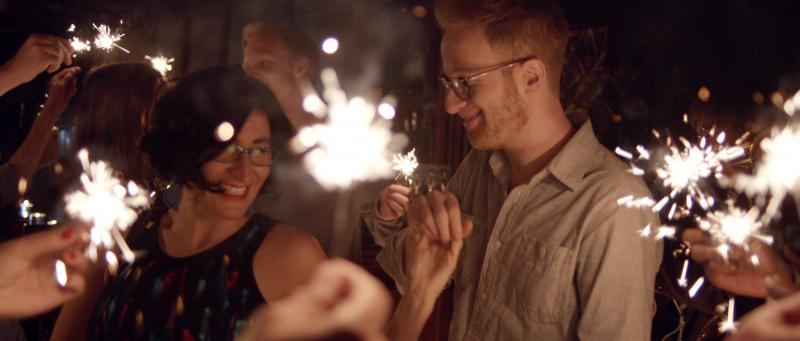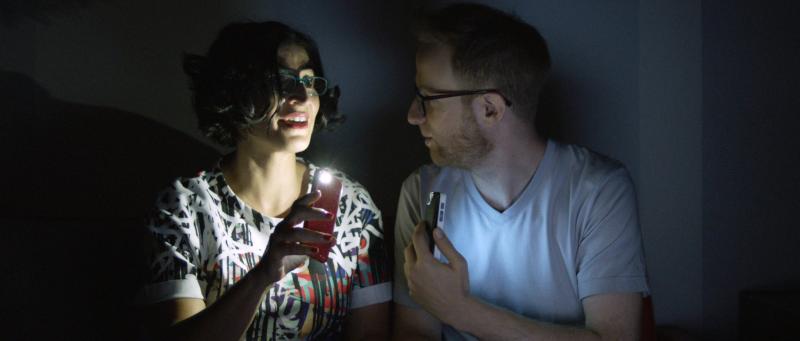'3rd Street Blackout''s Negin Farsad On Being A 'Hyphenated American' Female Filmmaker
“3rd Street Blackout” is a film about love in New York City. Sounds like it’s been done before, except that the film’s female star is not Meg Ryan, Rachel McAdams or any of Hollywood’s other favorite perky blonde protagonists, but Iranian-American Negin Farsad, a brilliantly funny (and adorable) “snazzy dresser” with librarian glasses… who’s also the film’s writer, director and producer, along with Jeremy Redleaf.

Farsad is a self-proclaimed “social justice comedian” who’s unafraid to tackle issues of racism and bigotry in her films, infusing them with her signature brevity and wit to bring people together through humor. After leaving her job as a senior policy advisor for New York City to pursue comedy and filmmaking full-time, self-proclaimed "hyphenated American" Farsad made a directorial splash with two funny-as-hell documentaries and got named one of Huffington Post’s funniest women (twice).
READ MORE: Angelina Jolie, The Director: What 'Unbroken' Means For Women In Hollywood
“3rd Street Blackout,” which premieres at the L.A. Film Festival on Saturday, is her first romantic comedy. It follows her character, Mina, and Jeremy Redleaf’s Rudy as they fumble through a power outage that leaves them phone-less and forced to deal with each other – and everyone else – face-to-face.
READ MORE: 6 Anticipated Films At The L.A. Film Festival
The story is based on Farsad’s own experience after Hurricane Sandy left her without power for five days. “It’s amazing,” she said of the blackout. “Nobody can get on their phones, text, constantly check their phones or email or worry about people that aren’t contacting them... It was honestly the most fun I’ve ever had in New York City. Also the most community.”
This heightened sense of connection brings personal issues to the surface for Mina and Rudy, as well as hinting at larger issues present in their community. “My last film was overt social justice comedy, and this one’s subtle,” said Farsad. “When I made ‘The Muslims Are Coming!’ the thing that became clear to me is the social problem with bigotry…the central issue is, people don’t know each other.”
READ MORE: Film Review: The Muslims Are Coming!
But the blackout changes things. “If life was like this all the time, and people knew each other, this kind of fringe radical bigotry wouldn’t emerge,” she said. “I wanted to build a story that had that kind of ideological underpinning, but also was fun.”
That ideological underpinning is something Farsad highlights in much of her work, including aforementioned “The Muslims Are Coming!,” a documentary that features a traveling comedy show aimed at destigmatizing Islam in America. As an Iranian-American woman, Farsad has a special understanding of the issues she highlights. “I think because I identify as a hyphenated American, I’m more sensitive,” she said. “Any time you can bring a different voice that’s sensitive to different layers of the population, it helps.”
Perhaps especially sensitive because she’s experienced discrimination herself. Sexism still pervades the film industry; even a very accomplished woman like Farsad can find it difficult to gain traction. Her understanding of how difficult it can be to succeed as a female director without getting pigeonholed has shaped the way she approaches filmmaking.

“I’m on my third film. If I were a man, I would have directed Godzilla already!" she joked. "That guy directed one movie, and then [the studio] gave him Godzilla.”
She remembers trying to sell her first movie after it premiered to great reviews at South by Southwest. “Literally in every meeting, everyone thought I was an intern. They would never even make eye contact with me. And then after the 20 minutes they spent thinking I was going to hand out something or get coffee…” she trailed off. “It just has never gotten better.”
For her, the issue is an engrained difference in how movie execs appraise men and women from the start. “I think what’s really common among female directors is you get the sense that you have to walk into the room and replay your entire resume, just to prove it’s okay that you’re there,” she said. “It’s exhausting.”
That attitude that women have to prove themselves, she says, makes all the difference in their ultimate success. “[Production executives] promote men based on promise, and they promote women based on experience.”
All of Farsad’s experience has taught her that, as difficult as "making it" as a female director is, it’s even harder for a female to make it as…a director. When her gender and culture typecast her into only producing films about women or Muslims, the success Farsad has had directing movies about her Iranian-American female experience sometimes, ironically, acts as a crutch when she wants to do something different.
“I think because I’m a female director, there’s this idea that I’m not flexible,” she said. “[That] I can’t direct a wide range of things. I got an email the other day about a production company that’s putting together stuff for a women’s organization, and they’re looking for female directors. And I was like, ‘I kind of wish you had said you were looking for a good director. Does it have to be good for female?' I get that all the time.”
That typecasting isn’t just a problem for directors offscreen; actresses in Hollywood are frequently pigeonholed into roles based on their age or race. It’s something Farsad is careful to avoid in her own movies, choosing to create complex characters who, while “ethnic,” are about more than their ethnicity.
“It was really important for us to have an Iranian character as the head of the story in a film that is not about being Iranian,” she said. “We see ethnic people in a movie and it’s like, they’re in the movie because they’re ethnic! It’s about how ethnic they are! And we were like no, can [Mina] just be a regular American in New York City having her own issues, and it’s not about her Iranianness, but we do happen to know she’s Iranian?”
“Why can’t one of the characters in "2 Broke Girls" be Indian, and the show is still about how the girls are broke?” she jokes.
That being said, she doesn’t believe in “erasing anyone’s identity” and ignoring race and ethnicity altogether (take note, Cameron Crowe).
She just wants to portray race like she sees it in the real world: “The default, average person [in film] cannot be a white person. That doesn’t make any sense,” she said. “So I want to make the media aware that we don’t assume whiteness is the everyman. The everyman isn’t white to me. “
“3rd Street Blackout” portrays a more realistic kind of everyman – one who may be white or may not be, who may be young or old or female or male – and the great, funny things that happen when those people all meet each other in the dark. Hit up that Saturday premiere – you can buy tickets here – or attend the second showing on Monday afternoon.
Contact Editor-in-Chief Gigi Gastevich here.

This story is part of a continuing series investigating 2015 issues in gender and sexuality.



